___________________________________________________________________________________________________________
Kennedy's New Frontier and Johnson's Great Society
'If two men agree on everything, you may be sure that one of them is doing the thinking.' Lyndon B. Johnson
___________________________________________________________________________________________________________
John F. Kennedy's New Frontier
Seminar: Monday 10th October 2005
John
F. Kennedy’s hyperactive presidency offered a ‘New Frontier’ to a nation
exceptionally susceptible to notions of cultural rebirth.
His iconic presence heralded a decade of challenge, excess and
disillusionment in which the moral and material presumptions of American
liberalism and of the United States’ role in the world were thrown into
disarray. Kennedy has been blamed
for inducing trauma through his inflated promises of national redemption, social
progress, economic prosperity and foreign policy advance.
The mobilising force of spectacular political leadership and public
glamour are thought to have heightened expectations to unrealisable levels.
President Kennedy’s mixed record of millennial rhetoric and political
caution, dramatic gestures and inadequate action, Cold War militancy and Peace
Corps humanitarianism, poverty awareness and social conservatism, and civil
rights support and Southern appeasement reflected a set of deep underlying
conditions which were equally ambiguous. Instead
of a break with the past, Kennedy’s media-soaked modernity was in many
respects compromised by continuities with the 1950s and the suburban complacency
of Eisenhower’s anodyne presidency.
JFK’s attempt to revive the language and urgency of the New Deal,
therefore, was fatally flawed and his reputation has continued to be the subject
of deep contention, torn as it is between the extremes of belief and emotion
that his name continues to evoke in the United States.

The Decision to Go to the Moon: President John F. Kennedy's May 25, 1961 Speech before a Joint Session of Congress (Johnson behind on the left)
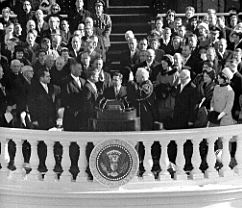

Above left: Kennedy's inauguration (Johnson and Richard Nixon are standing behind JFK). Above right: Berlin, June 1963.
Questions
What did John F. Kennedy mean by the phrase the 'New Frontier'?
Analyse John F. Kennedy's inauguration speech in order to identify a) references to the resurrection of the 'New Deal' and b) the promise of a break with the stagnation of the Eisenhower years
Discuss Kennedy's record on Civil Rights
Was Kennedy's administration essentially the triumph of style over substance? Discuss with reference to the 'New Frontier' and the Peace Corps
Assess Kennedy's performance during the Cuban Missile Crisis
Readings (web links in blue)
President Kennedy’s Inaugural Address (MP3)
Douglas T. Miller, On Our Own: Americans in the Sixties (Heath)
Compulsory
Reading
Eric Foner, The Story of American Freedom
David
Steigerwald, The Sixties and the End of
Modern America, 1-20, 38-55, 69-78
James L. Sundquist, Politics and Policy
Supplementary
Reading
General
James
Giglio, The Presidency of John F. Kennedy, esp. chs. 8 and 10-11
Mark
J. White, ed., Kennedy: The New Frontier Revisited, chs. 1-2
Hugh
Brogan, Kennedy
Norman
Mailer, "Superman Comes to the Supermarket" in Mailer, Presidential
Papers
Herbert
S. Parmet, JFK: The Presidency of John F.
Kennedy
Richard
Reeves, President Kennedy: Profile of
Power
Thomas
C. Reeves, A Question of Character: A Life
of John F. Kennedy
Arthur
M. Schlesinger, Jr., A Thousand Days: John
F. Kennedy in the White House
Foreign
Policy
Thomas
Paterson, ed., Kennedy's Quest for
Victory: American Foreign Policy, 1961-1963,
pp. 3-23 and 123-55
Stephen
Ambrose, Response to Globalism: American
Foreign Policy since 1938, chs.
10-11
Michael
Beschloss, The Crisis Years: Kennedy and Khrushchev, 1960-1963
Mark
J. White, The Cuban Missile Crisis
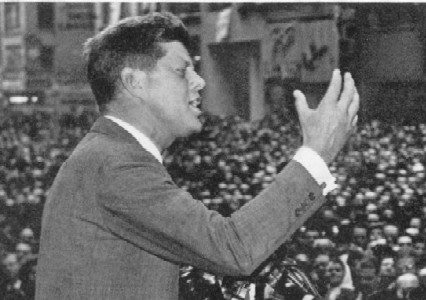 The Icon: JFK in Berlin, June 1963
The Icon: JFK in Berlin, June 1963
________________________________________________________________________
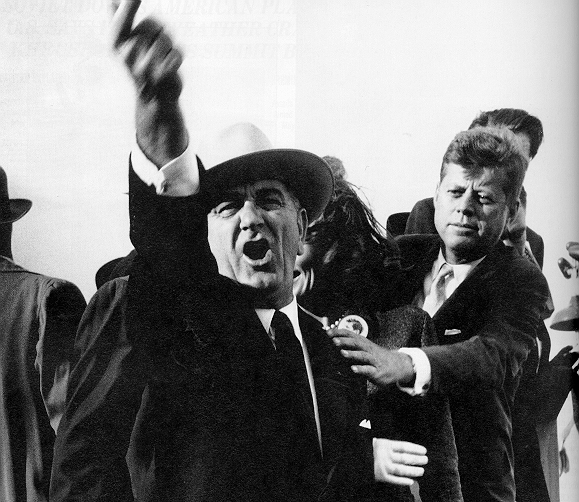
________________________________________________________________________
Lyndon B. Johnson’s Great Society
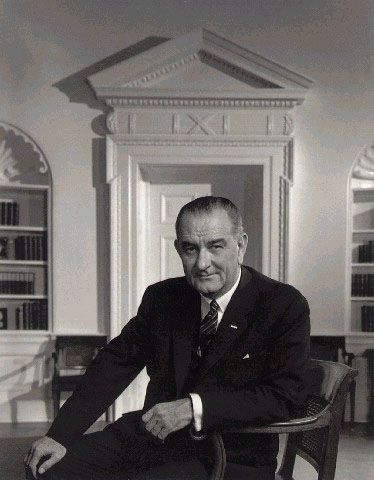
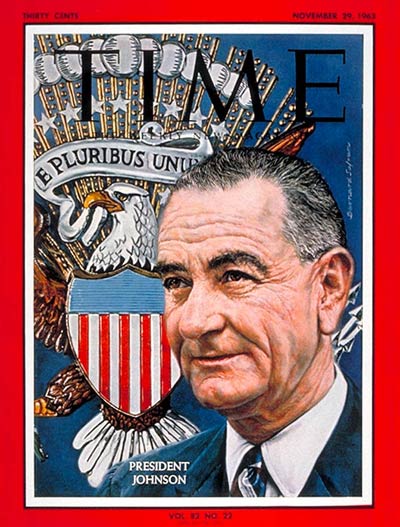
Seminar: Monday 17th October 2005
Lyndon B. Johnson,
Kennedy's successor, promised to build a 'Great Society' free from poverty,
illiteracy and discrimination which would be fit to lead the world—and glorify
the name of LBJ. Johnson's project
was to continue the work of Franklin Roosevelt and construct a 'second New Deal'
which would complete the work of the first and, indeed, go further by raising up
the underprivileged, those at the very bottom whom the original New Deal had
hardly touched, and tackling problems of racial discrimination which the
original New Deal had ignored. The
legislative achievements of the early Johnson years were extraordinarily
wide-ranging, including civil rights, the War on Poverty, a huge expansion of
social security and welfare, urban renewal, federal aid for education, and
wide-ranging consumer and environmental protection laws.
But, in his 'striving for hyper accomplishment', Johnson simply tried to
do too much. In particular, the
civil rights and antipoverty programmes raised expectations that they could not
fulfil. The political fallout jeopardised both the Administration and the
future of post-war liberalism. In
the end, Johnson turned out to be a tragic figure.
His determination to carry all before him in Vietnam brought him to
political disaster. In this seminar
we will examine the scope and objectives of the Great Society programme and its
wider impact on American society and politics.
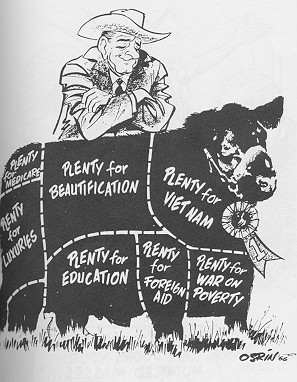
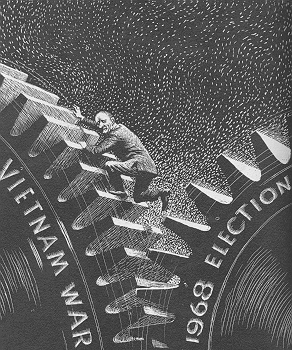
Readings (web links in blue)
Douglas
T. Miller, On Our Own: Americans in
the Sixties (Heath)
Johnson, Great Society speech and other documents
Edwin
Amenta, Bold
Relief: Institutional Politics and the Origins of Modern American Social Policy
(1998).
John
A. Andrew III, Lyndon
Johnson and the Great Society (1999)
Irving
Bernstein, Guns or Butter: The Presidency of
Lyndon Johnson (1996)
Vaughan
Bornet,
The
Presidency of Lyndon B. Johnson (1983)
Joseph
A. Califano, The
Triumph and Tragedy of Lyndon Johnson (1991)
Robert
A. Caro, The
Years of Lyndon Johnson: The Path to Power (1982)
____________,
The
Years of Lyndon Johnson: Means of Ascent (1990)
Robert Dallek, Lone Star Rising (1991)
Eric Foner, The Story of American Freedom
James L. Sundquist, Politics and Policy
Compulsory
Reading
Steigerwald, The Sixties and the End of Modern America,
21-37, 69-90,
187-215.
Johnson, “Great Society”
speech and other documents
Supplementary
Reading
Alonzo
Hamby, Liberalism and Its Challengers: From FDR to Bush, ch. 6
Robert
Harrison, State and Societyin
Twentieth-Century America, ch. 10
Bruce J. Schulman, Lyndon
B. Johnson and American Liberalism
Allen
Matusow, The Unraveling of America,
Part II
Robert Divine, ed., The
Johnson Years, Vols. I and III
Jim
F. Heath, Decade of Disillusionment: The
Kennedy-Johnson Years
Conkin, Paul K. Big
Daddy from the Pedernales: Lyndon Baines Johnson
Dallek, Robert. Flawed
Giant: Lyndon Johnson and His Times, 1961-1973
Irving Bernstein, Guns and Butter: The
Presidency of Lyndon B. Johnson
James
T. Patterson, America's Struggle against
Poverty, 1900-1985, Parts III-IV
Michael Katz, In
the Shadow of the Poorhouse, Part III
Nicholas Lemann, The Promised Land: The Great Black Migration and How It Changed
America,
109-221
Arnold
R. Hirsh and R.A. Mohl, eds., Urban Policy
in Twentieth-Century America, ch. 1
1.
What does Lyndon B. Johnson mean by the Great Society?
Is his a radical vision, or is it one that emerges from the liberal tradition in American
politics?
2.
How realisable were Johnson’s objectives?
3.
How do Johnson and Humphrey conceptualise poverty?
What do they see as causing it, and how do they believe that it should be
tackled?
4.
What were the principal policies designed to ameliorate poverty?
How successful were they?
5. Think about the following and the Great Society: the impact of the Vietnam War; criticism from the left; the conservative "backlash".
Johnson speechesThe life of Lyndon Baines Johnson
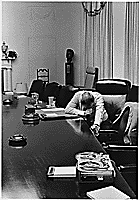 The strain of Vietnam: LBJ, 1968
The strain of Vietnam: LBJ, 1968
Civil Rights PowerPoint lecture
Governor George C. Wallace (below), The Civil Rights Movement: fraud, sham and hoax
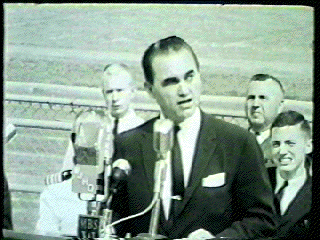
________________________________________________________________________
· American Studies UWA ·